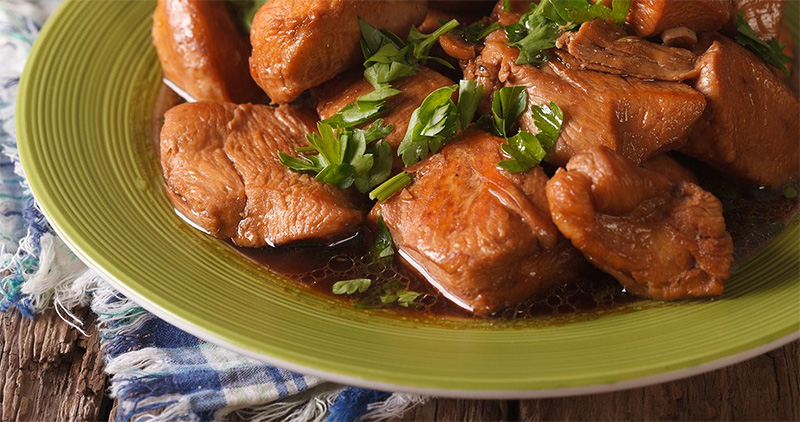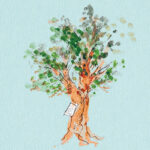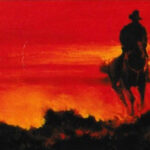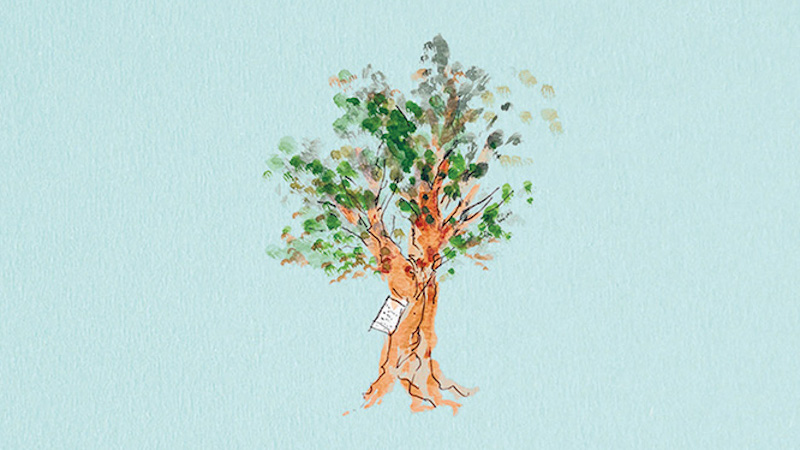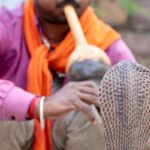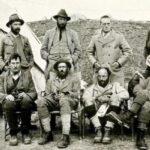Remembering My Lola By Teaching Myself How to Cook
She Taught Me to Take Whatever I Had and Make a Home Out of It
My lola was my mother—my chosen mom after Mercy, my birth mother, left when I was two or three years old. Mercy always said my grandmother would raise me better than she ever could; although she moved just a few blocks down from us in Carson, she rarely came around, missed all the birthday parties, first days of school, my first menstruation, my first everything.
My lola Pacita—Mama, as I called her—was the woman who taught me everything there was in being a woman. She was born in a coastal village off the shore of the South China Sea in the Philippines. She was the second eldest, an aristocratic daughter of the mayor in Aringay, La Union. Her father, my great-grandfather, Isidro Dulay Sr., owned a large cigar factory and employed the whole town during my lola’s youth. Her sisters still joked that she made up the term “fashionably late”; every Sunday during mass, she would arrive half an hour late and walk down the center aisle with her heels clicking, interrupting the priest’s sermon. She wore long, butterfly-style dresses sewed by her younger sisters and golden earrings and rings, her hair immaculate with that Imelda Marcos bump, eyes kohled and beckoning. Before she turned 20, she returned home after her big move to Manila, where she graduated from the Philippine Normal School to become a teacher. It was 1940, just a year before World War II broke out across the country and fighter jets bloodied the skies.
Mama survived the war, but not without being captured by the Japanese soldiers and held in a garrison for three months. When her father wanted her to marry a Chinese mestizo from another aristocratic familia, Mama chose to elope instead with a US-Philippine Army officer turned guerrilla—my grandfather—who died before I was born. My grandfather’s heroic status from the war made my familia an easy target for Ferdinand Marcos when he came to power after the United States granted the Philippines its independence. Marcos claimed to be the “most decorated war hero of the country,” and our family became poor because my grandfather refused to lie about his faux war medals. Marcos stripped my grandfather of his retirement and his rank, and we were thrust into poverty, especially since my great-grandfather’s cigar factory and the mansion that my grandmother grew up in were burned during the war.
But Mama was the matriarch of the family. When her daughter, Auntie Lodie, married a US sailor in the 1960s, she convinced her to apply for her visa to the United States. When Mama finally arrived in California, she fought and paid to petition for every one of her children and siblings to come to America. During the late ’70s and ’80s, she worked in the tuna canneries, where her lungs filled with the fog of the San Pedro harbor, to make sure that everyone had something to eat on the table.
Mercy was right. Mama taught me everything: how to dress, draw my eyebrows, pencil in my lips, articulate, sit up straight and like a lady, cross my legs, command a room, distract a stranger if he insulted me, laugh, make friends, debate, trust my intellect, fight for my intellect. Mama was always my champion—the first one to tell anyone off, even if he was the principal of my middle school. The story is this: my father abruptly took me out of sixth grade and flew me halfway across the world to Manila, where I stayed for the next three months. My sister and I were supposed to be there for only a week, for my aunt’s funeral. I missed the rest of sixth grade. When I returned, my teacher wanted me to repeat the year. Mama would not have it—she marched into the principal’s office, pointed her finger, and shouted: “You will not put my daughter in sixth grade; my daughter is too smart; you see, my friend, my daughter is too smart. You are my friend, yes? Don’t push Melissa back a grade.”
The only thing Mama did not teach me was how to cook.
She was renowned among my family for being the best cook, the only cook, a maestro in the kitchen. Even Mercy, when she was still in our lives, had adored her cooking. Mercy once said that the only thing she couldn’t beat was Mama’s chicken adobo, something I sought so desperately to learn from her when I was child. But Mama was a hawk, a falcon, a lone wolf in the kitchen. Every dish was her secret recipe, every dish an artistic expression she made with her bare hands.
“Mama taught me everything: how to dress, draw my eyebrows, pencil in my lips, articulate, sit up straight and like a lady, cross my legs, command a room, distract a stranger if he insulted me, laugh, make friends, debate, trust my intellect, fight for my intellect.”When I was a child, Mama tilled an Eden on Dolores Street, the one house I remember fondly from those turbulent times. Before I had reached the age of 12, I must have moved to over eight apartments or houses, living with this or that relative, this or that aunt, this or that uncle. It was Mama who made sure we had, at least, a roof over our heads. When we did have a house, a beautiful mission-style home on Dolores, she made a garden out of pink flowers, rooting and placing them all in the fountain out front, where an ivory wooden veranda enclosed the baby angel that stood at the epicenter. A wall of cacti lined the right side of the house. She would cut off the fleshy bits of the cacti and make a delicious dessert out of them with milk, sugar, and chopped avocados. She watered the mango and avocado trees with precision, every morning and every sunset.
Every day after school, I came home, walked into the yellow-tiled kitchen, and asked Mama, “Would you teach me how to cook Filipino food?”
She would smile out of disbelief that I thought she was willing to let anyone else into this cooking world of hers, a private space she kept hidden even from her two daughters and eight sons. She never wrote down recipes, always cooked by eyeing the soy sauce and vinegar, tasting the sauce before serving, and always said, “The saltier, the better, anak,” the Filipino word for child.
Every time, it seemed that she would begin to teach me how to cook by placing ingredients on the bamboo cutting board and saying, “Feel the bay leaves. Touch the chile pepper. Smell the garlic.” All from the garden she tilled out front. But that was as far as it went. When it got to stirring the sauce, or frying the onions and garlic, or cutting up the chiles, she would smack my hand away, shoo me off with her arms, and tell me, “Get out of my kitchen or else, bahala na,” warning me that anything could happen.
I didn’t learn how to cook until I was very far away from her, when I, too, had eloped with a US sailor. We both had our reasons to marry into the military, and it was always about survival.
Back then, when I created a recipe for my own chicken adobo, I was living in Charleston, South Carolina, 1,500 miles away from Los Angeles, 1,500 miles away from the place where Mama raised me. There was no Chinese, Filipino, Thai, or Indian restaurant for miles. My husband and I had to make do with the right ingredients from the commissary, where there was at least an aisle for Filipino ingredients, like Datu Puti vinegar.
Mama, by then, had already passed. She was buried deep within the hills between San Pedro and Palos Verdes, submerged in the earth with my grandfather, the war hero she had loved deeply before my time.
“The day I learned how to cook, the day I learned to make my own chicken adobo, just the way Mama would have loved it, I was alone.”One day at the commissary, there was a lola who walked very slowly, holding her grandson, pointing at different products and naming them aloud. I sighed, and the lola turned to me to apologize, to excuse her slowness. I shook my head, said, “No, no, I just miss my lola.” She said, “Ah, anak, where is she now? Here? Home in the Philippines?” I said, “No, Lola, she has passed on.” She gave me that sad, sad meaningful look Mama would give me, the face she used as she’d point to everyone in the store and say, “You see there? He is my friend, my good friend!” That face of longing, like she was judging the world intently.
I could see the lola hold her grandson’s hand a little tighter. She asked me where she passed, and I said California. She repeated the word the same way Mama would, the right pitch, accent, and sadness. “Oh, California? Not home?”
The day I learned how to cook, the day I learned to make my own chicken adobo, just the way Mama would have loved it, I was alone. My husband was away at duty that night, like most nights while he was still in the navy, and I was thinking of Mama. I always am. It’s in the way I pick out fruits, touch basil or bay leaves, peer at them and hold each one in my hand firmly as if I were judging the world. It’s the way I look at every Filipino in the grocery store and think: that person, they’re my friend. And because I missed her so, I willed this chicken adobo out of me.
My first step was calling my father to ask how my grandmother made his favorite dish. He barely remembered, but he at least remembered the ingredients, which is all I really needed. My father’s fractured memory helped me create my own chicken adobo, made in my own secret recipe, in my own private world—something, I know, Mama would be proud of. She taught me everything. (Everything but how to cook!) But the most important gift she left me was this: to take whatever I had, whatever was left, and make a home out of it, a home I could call my own, no matter where I go.
__________________________________
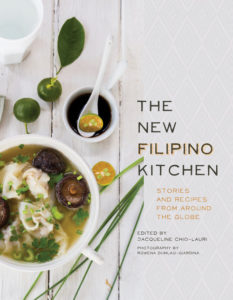
Reprinted with permission from The New Filipino Kitchen edited by Jacqueline Chio-Lauri, Agate Surrey, 2018. Copyright © 2018 by Melissa Sipin.

